Health
-
Lin Test
text with link. This is a quiz. Some text Name Name Quo modo autem philosophus loquitur? Tecum optime, deinde etiam cum mediocri amico. Invidiosum nomen est, infame, suspectum. Name Name…
-

Gender-affirming care is rare, study says
Fewer than 1 in 1,000 transgender youth receive hormones or puberty blockers

-

Nature offers novel approach to oral wound care
Slug’s sticky mucus inspiration behind adhesive hydrogel that can seal wounds in wet environment

-

Time for a rethink of colonoscopy guidelines?
Change informed by new findings would help specialists focus on those most at risk, researcher says

-

Should pharmacists be moral gatekeepers?
‘The problem is not opioids,’ says author of ‘Policing Patients’ — it’s overdose, pain
-

The deadly habit we can’t quite kick
Actions by tobacco companies worry researcher even amid ‘dramatic decrease’ in smoking among young Americans

-
Detailed metabolic profile gives “chemical snapshot” of the effects of exercise
Using a system that analyzes blood samples with unprecedented detail, a team led by Harvard Medical School (HMS) researchers at Massachusetts General Hospital (MGH) has developed the first “chemical snapshot”…
-
New insights into the mystery of natural HIV immunity
When people become infected by HIV, it’s usually only a matter of time, barring drug intervention, until they develop full-blown AIDS. However, a small number of people exposed to the virus progress very…
-
Pres. Faust calls global health one of her main priorities for Harvard;
Declaring the University’s efforts to improve the state of global health knowledge, education, and capacity building to be one of her “very highest priorities” as president of Harvard, Drew Faust…
-
Processed meats come with increased risk of heart disease, diabetes
In a new study, researchers from the Harvard School of Public Health (HSPH) have found that eating processed meat, such as bacon, sausage, or processed deli meats, led to a…
-
Exploring a world within a world
Lichens provide an avenue for student scientific exploration of plant complexity.
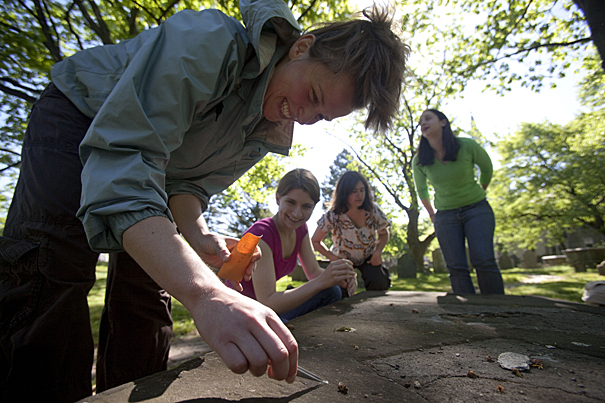
-
Money not cure-all for health care
Analysts from around the world gathered at Harvard Business School for a think tank on health care reform.
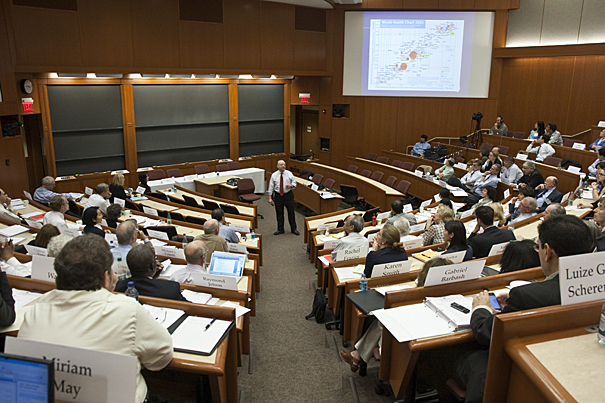
-
Designer vaccines may tailor immune response
In Margaret Atwood’s futuristic The Year of the Flood, sex workers wear “Biofilm Bodygloves” to protect themselves from infection. It turns out, though, that a prototype bodyglove may have already…
-
HIV, malaria, women, and children
Harvard, Boston University, and the Center for Strategic and International Studies hosted a seminar to unveil a report on the future of global health policy that calls for more money for women and children and a continued focus on HIV, malaria and tuberculosis.

-
Gene silencing may cause limitations of induced pluripotent stem cells
Scientists may be one step closer to being able to generate any type of cells and tissues from a patient’s own cells, according to the results of a new study by Harvard…
-
Doubling health spending in low-income countries improving health budget less than expected
Low-income countries have doubled their domestic spending on health overall, reports a major new study over 12 years ending in 2006, but international health aid may not be adding as…
-
Height and death
Mothers shorter than 4 feet, 9 inches in low- to middle-income countries had about a 40 percent higher risk of their children dying within the first five years of life than mothers who…
-
Get the salt out
Responding to the health threat posed by Americans’ over-consumption of sodium, experts in the department of nutrition at Harvard School of Public Health (HSPH) and The Culinary Institute of America…
-
In praise of the Y chromosome
David Page, director of the Whitehead Institute and professor of biology at Massachusetts Institute of Technology, says research indicates the much-maligned Y chromosome plays a more critical role in genetics than previously believed.

-
The nicotine-candy connection
A new nicotine product, apparently designed to tide smokers over in places where they can’t light up, resembles some candy. It leads to fear among researchers that children will eat the pills and suffer poisoning.

-
Researchers warn new, dissolvable nicotine products could lead to accidental poisoning in children and youths
A tobacco company’s new, dissolvable nicotine pellet–which is being sold as a tobacco product, but which in some cases resembles popular candies–could lead to accidental nicotine poisoning in children, according…
-
From lab trash to treasure
Surplus and waste laboratory equipment from Harvard is finding new life in labs overseas through two student groups and a nonprofit started by a former Harvard graduate student.

-
When cost-cutting backfires
Chronically ill elderly patients, when asked to bear a higher share of health care costs, cut prescription drug use and office visits. Consequently, they were hospitalized more often, according to a Harvard Kennedy School study.
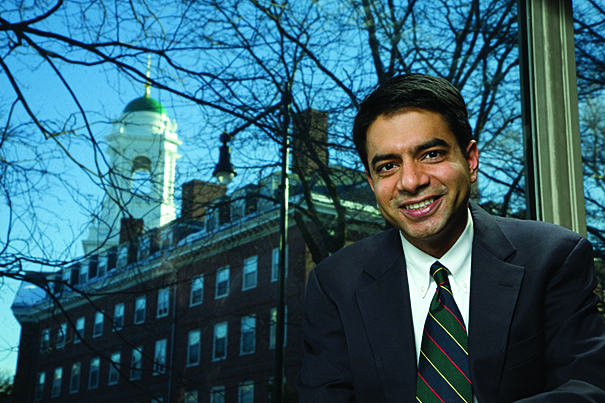
-
Novel artificial pancreas controls blood sugar more than 24 hours
An artificial pancreas system that closely mimics the body’s blood sugar control mechanism was able to maintain near-normal glucose levels without causing hypoglycemia in a small group of patients. The…
-
Electronic medical records not a panacea?
The implementation of electronic health record systems may not be enough to significantly improve health quality and reduce costs. In the April 2010 issue of Health Affairs, Harvard researchers from…
-
Childhood cancer survivors may face shortened lifespan, study reveals
Although more children today are surviving cancer than ever before, young patients successfully treated in the 1970s and 80s may live a decade less, on average, than the general population,…
-
Killer mushrooms!
It is thought to have been responsible for the deaths of emperors. In parts of California’s forests, it is everywhere. It is the deathcap mushroom, Amanita phalloides, so filled with…
-
Treatment resistance in some cancer cells may be reversible
The ability of cancer cells to resist treatment with either targeted drug therapies or traditional chemotherapy may, in some cases, result from a transient state of reversible drug “tolerance.” In…
-
A ‘mind-blowing’ day
Vermont high school students explore the human brain, with help from Harvard scholars.
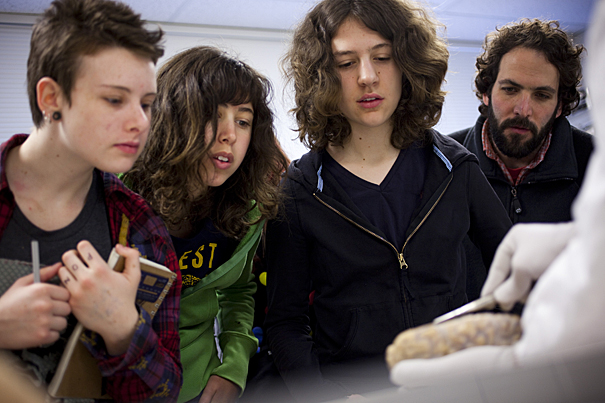
-
Understanding the deadly deathcap
Biology Professor Anne Pringle is taking the study of one of the world’s most poisonous mushrooms out of the realm of adventure stories and into the world of ecology, in an attempt to better understand how it spreads.
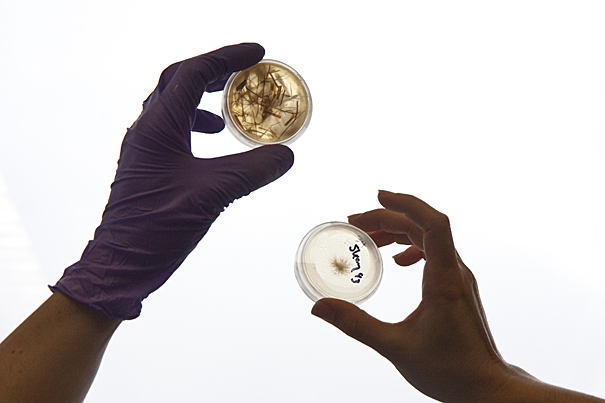
-
Did rapid brain evolution make humans susceptible to Alzheimers?
Of the millions of animals on Earth, including the relative handful that are considered the most intelligent — including apes, whales, crows, and owls — only humans experience the severe…
-
Alzheimer’s for humans only
Disorders that result in severe neurological decline, such as Alzheimer’s disease, are not found in other animals, meaning that humans acquired their predisposition to the disease during recent evolution.
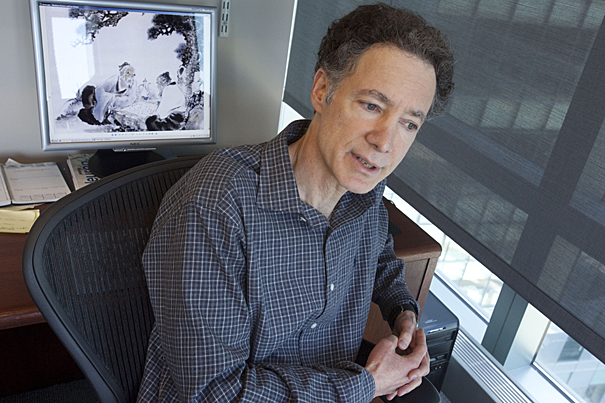
-
Post Traumatic Stress Disorder knows no international boundaries
The diagnosis and treatment of post-traumatic stress disorder has come a long way since the 1970s, with research now showing it is both more common and more treatable than once…
-
Internet offers risks as well as benefit to patients
The Internet has had a profound effect on clinical practice by providing both physicians and patients with a wealth of information. But with those rewards come risks of incorrect or…
-
Post-traumatic stress
Terry Keane, a longtime PTSD researcher and associate chief of staff for research and development at the Veterans Affairs Boston Healthcare System, says researchers in recent years have learned much about post-traumatic stress, including that it is both more prevalent and more treatable than previously supposed.
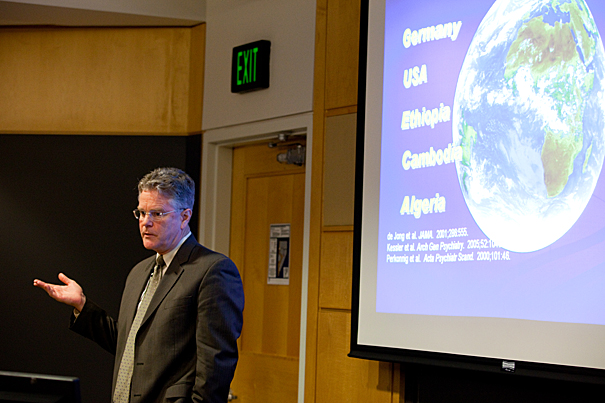
-
‘I thought a bomb went off’
As twilight fell over Port-au-Prince that first terrible night after Haiti’s January earthquake, Louise Ivers watched a strange cloud of dust settle over the city. Stirred by buildings collapsing as the late afternoon quake struck, the cloud was pierced only by sound, a rising chorus of screams from across the capital as the toll became apparent.

